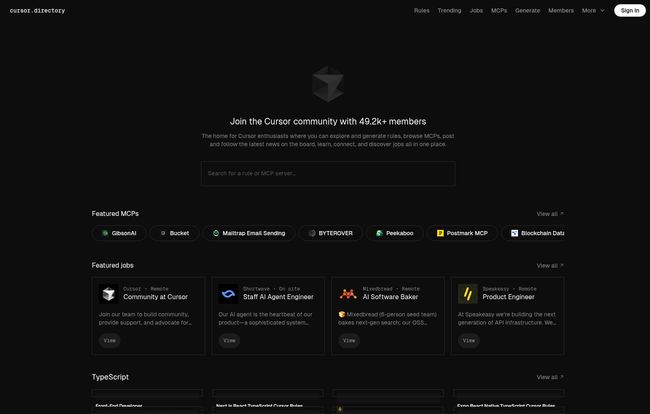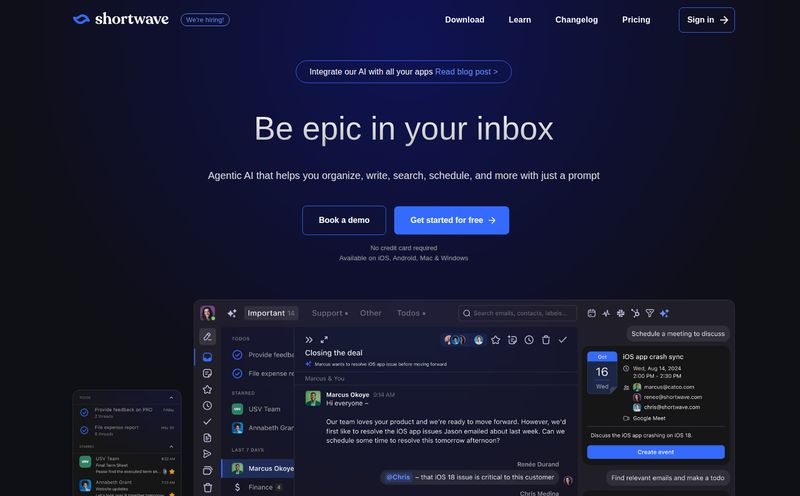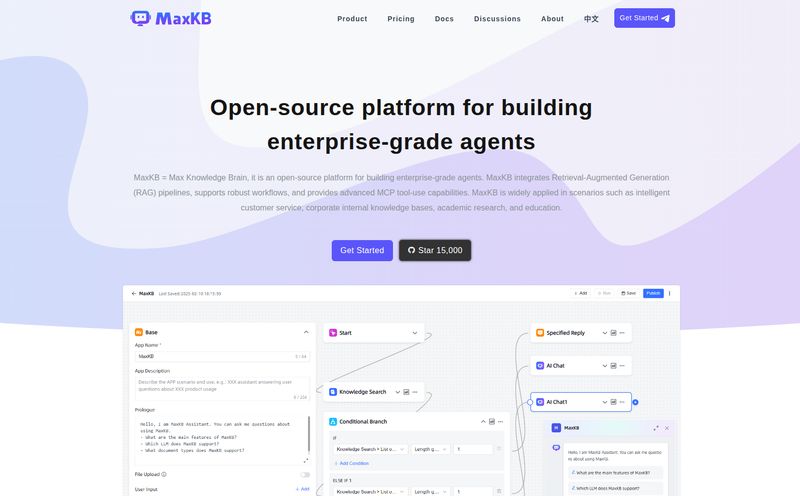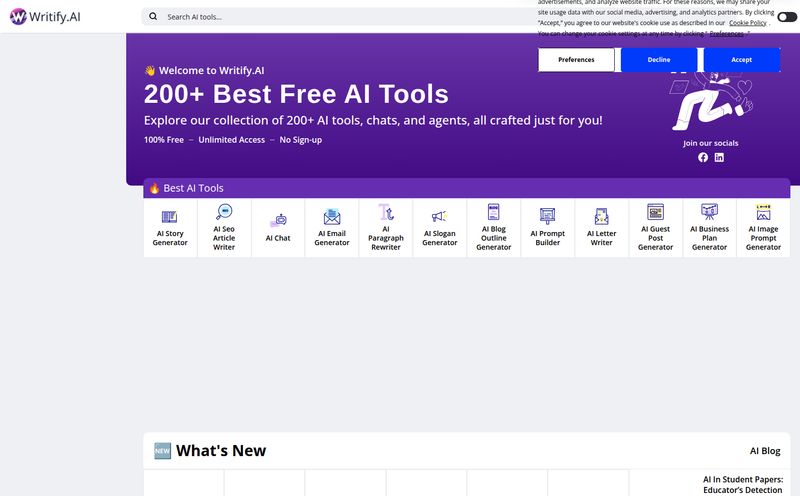There’s a certain magic to finding a new tool that just clicks with your workflow. For a lot of us in the dev world right now, that tool is Cursor. The initial experience is pretty wild—it feels like you’ve suddenly got a senior dev paired up with you 24/7. But after that initial “wow” factor wears off, a new question pops up: “Okay, how do I really get the most out of this thing?”
You start wondering if your prompts are any good. You wonder how other people are setting up their projects. You start hunting through Discord channels and obscure Reddit threads, piecing together best practices like a digital detective. It’s a bit of a grind.
Well, I recently stumbled upon something that feels like the community-built answer to that grind. It’s called the Cursor Directory, and honestly, it’s the missing town square I didn’t know I needed for my AI coding adventures. It's not perfect, but it's got a soul. Let’s get into it.
So, What Exactly is the Cursor Directory?
Think of it less like a polished, corporate app store and more like a bustling, slightly chaotic communal workshop. The Cursor Directory is a hub, built by and for its 40,000+ members, to share resources specifically for the Cursor code editor. It’s a place to find and share custom rules, browse active MCP servers (we'll get to those), and even scout for jobs that value your AI-native skills.
What I like about it immediately is that it’s not trying to be slick. It feels authentic. It’s a resource born out of a genuine need from people who are in the trenches, using the tool every single day. It’s the kind of thing that pops up when a technology starts to build a real grassroots following.
The Core Features I’m Actually Using
Alright, let’s talk about the good stuff. The site has a few key areas, but a couple of them really stand out as immediately useful.

Visit Cursor Directory
A Goldmine of Custom Rules
This, for me, is the main event. Writing effective prompts or “rules” for an AI is its own art form. You can spend ages trying to phrase something just right to get the output you want. The Directory is packed with user-submitted rules for all sorts of languages and frameworks. I saw collections for Next.js, React Native, Javascript, and even—as their site so charmingly misspells it—“TypeScriprt.”
And you know what? I love that little typo. It’s real. It tells me this was built by developers who were probably more focused on shipping the feature than running a spell check, and I can respect that.
Instead of starting from scratch, you can grab a rule for, say, “Refactor React Component to use Tailwind CSS Best Practices,” and you're good to go. It’s a massive time-saver and a brilliant way to learn how to structure more effective prompts. It’s like having a cheat sheet compiled by thousands of other developers.
Finding Your Crew with MCP Servers
The “Featured MCPs” section is front and center. If you're not familiar, MCPs seem to be the Directory's term for community servers or collaborative instances. The page lists servers with names like Gibson.ai, Bucket, and BYTEROVER. This feature turns Cursor from a solitary tool into something more collaborative. You can find active communities to join, see what they're building, and maybe get some inspiration.
Now, a word of caution here. Because this is community-run, the quality and activity of these servers will vary. Some might be bustling hubs of innovation; others could be digital ghost towns. It's on you to do a little exploring, but the directory at least gives you a map to start with.
A Job Board That Gets It
This might be the most underrated feature. How many times have you scrolled through a generic job board looking at roles that don't appreciate modern, AI-assisted workflows? The Cursor Directory's job board is the opposite. It features jobs like “Staff AI Agent Engineer” and “Senior Product Engineer” from companies that are actively seeking people who are fluent in AI-first development.
It’s a niche, for sure, but it’s a powerful one. If you’ve invested time in mastering Cursor, this is a place where that skill is not just a footnote on your resume but a headline feature. It shows a real understanding of where the industry is heading.
The Vibe: Is It Just Another Forum?
Not really. While it has forum-like elements, its structure is more about resources than just conversation. The “Trending in Cursor” section is a great example. It acts like a pulse check on the community, showing what's currently hot. When I checked, there were posts about a new code review system prompt and a newly discovered security flaw—practical, timely information that you might otherwise miss.
It’s this focus on actionable stuff that makes it feel different. It’s less about idle chatter and more about collective improvement. We're all trying to figure out this new paradigm of coding, and the Directory feels like a shared set of notes on the subject.
The Good, The Bad, and The Community-Driven
Let's be real, no tool is perfect. And a community-driven one has its own unique quirks.
The biggest strength is its biggest potential weakness: it all hinges on the community. The content is amazing because people are contributing. If that slows down, the directory could become stale. Rules could become outdated, and MCP servers could go dark. It's the classic double-edged sword of any open, collaborative project. But for now? It’s thriving.
The upside of this is immense. Having a centralized place for all this knowledge is fantastic. No more scrounging around on the internet for scraps of information. It's all here. And the job board is just a brilliant touch, connecting talent with forward-thinking companies.
And the price? From everything I can see, the Cursor Directory is completely free to use. There's no pricing page, no subscription modal. In an age where every useful service seems to have a pro tier, that's incredibly refreshing.
Who Is This Really For?
If you just downloaded Cursor yesterday to see what the fuss is about, the Directory might be a bit much. But if you're a developer, engineer, or team lead who has seriously integrated Cursor into your day-to-day... this is for you.
It’s for the power user who wants to fine-tune their AI assistant. It’s for the freelancer looking for their next gig with a team that speaks their language. And it’s for the curious coder who just wants to see how a whole community is pushing the boundaries of a new technology. It's a place for people who are past the 'what is it' stage and deep into the 'what can I build with it' phase.
In the end, the Cursor Directory is more than just a website. It’s a sign of a healthy, growing ecosystem. A powerful tool is one thing, but a powerful tool with a passionate community behind it? That’s something else entirely. It’s a testament to the idea that the future of software development isn’t just about smarter tools, but about smarter collaboration between the people who use them.
It might have its rough edges, but it’s got heart. And in my book, that counts for a lot. I’d recommend any serious Cursor user to bookmark it. You’ll probably find yourself coming back to it more often than you think.
Frequently Asked Questions
What is the Cursor Directory?
The Cursor Directory is a community-driven website and resource hub for users of the Cursor AI code editor. It provides a centralized place to find and share custom rules, browse MCP servers, find jobs, and stay up-to-date with news in the Cursor community.
Is the Cursor Directory free to use?
Yes, based on all available information, the Cursor Directory is completely free for everyone to use. There are no subscription fees or paid tiers mentioned on the site.
Can I find jobs on the Cursor Directory?
Absolutely. The platform features a dedicated job board with positions from companies specifically looking for developers and engineers skilled in using Cursor and AI-first development workflows.
What are Cursor "rules" and why do I need them?
In the context of Cursor, "rules" are essentially well-crafted prompts or instructions that you give the AI to perform specific tasks, like refactoring code, generating boilerplate, or following certain style guides. The Directory provides a library of pre-made rules so you don't have to write them from scratch.
How do I contribute to the Cursor Directory?
The platform is community-driven, so users are encouraged to contribute. You can typically sign in to post your own rules, share information, or potentially list an MCP server. The goal is for the community to collectively build the resource library.
Is this an official tool from the creators of Cursor?
It does not appear to be an official product from the company behind Cursor (cursor.sh). It presents itself as a community-run initiative, created by and for the users of the editor, which is why it has such a grassroots feel.
Reference and Sources
- Cursor Directory: https://cursor.directory/
- Cursor Official Website: https://cursor.sh/



